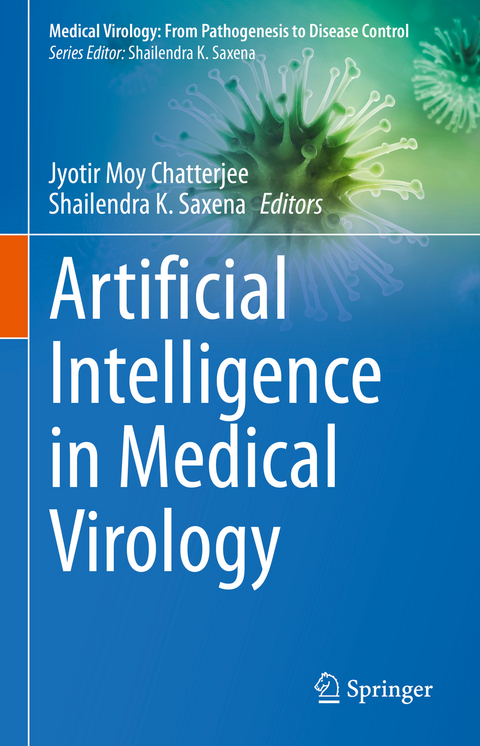
Artificial Intelligence in Medical Virology
Springer Verlag, Singapore
978-981-99-0368-9 (ISBN)
Furthermore, the book covers the applications of artificial intelligence-mediated diagnosis and the development of drugs to treat the disease. Towards the end, the book summarizes the ethical and legal challenges posed by AI in healthcare and biomedical research. This book is an invaluable source for researchers, medical and industry practitioners, academicians, and students exploring the applications of AI in biomedical research and healthcare.
Mr. Jyotir Moy Chatterjee is currently working as an Assistant Professor in the Department of Information Technology at Lord Buddha Education Foundation, Kathmandu, Nepal. Before this, he worked as an Assistant Professor in the Department of Computer Science Engineering at G. D. Rungta College of Engineering & Technology (Chhattisgarh Swami Vivekananda Technical University), Bhilai, India. He received M. Tech in Computer Science & Engineering from Kalinga Institute of Industrial Technology (KIIT), Bhubaneswar, Odisha in 2016, and a B. Tech in Computer Science & Engineering from Dr. MGR Educational & Research Institute, Maduravoyal, Chennai in 2013. His research interests include Machine Learning & Deep Learning. Professor (Dr.) Shailendra K. Saxena is Vice Dean and Professor at King George's Medical University, Lucknow, India. His research interests are to understand the molecular mechanisms of host defense during human viral infections and to developnew predictive, preventive, and therapeutic strategies for them using emerging and re-emerging viruses as a model, via stem cell and cell culture technologies. His research work has been published in various high-impact factor journals (Science, PNAS, Nature Medicine) with high citations. He has received many awards and honors in India and abroad including various Young Scientist Awards, the BBSRC India Partnering Award (UK), Dr. JC Bose National Award of the Department of Biotechnology, Min. of Science and Technology, Govt. of India, and Fellow of various internationally prestigious societies/academies including The Royal College of Pathologists (UK), Royal Societies of Biology and Chemistry, London, United Kingdom, Academy of Translational Medicine Professionals, Austria, Indian Virological Society, and is named as the Global Leader in Science by The Scientist magazine (USA) and International Opinion Leader/Expert involved in the vaccination for JE by IPIC (UK).
Chapter 1. Artificial Intelligence for Global Healthcare.- Chapter 2. Artificial Intelligence for Epidemiology COVID-19: Quick Assessment.- Chapter 3. Artificial Intelligence in rural health in developing countries.- Chapter 4. THE ROLE OF ARTIFICIAL INTELLIGENCE TO TRACK COVID-19 DISEASE.- Chapter 5. Artificial Intelligence Techniques based on K-Means two way Clustering and Greedy Triclustering approach for 3D Gene Expression Data (GED).- Chapter 6. Detection of COVID-19 cases from X-Ray and CT Images using Transfer Learning & Deep Convolution Neural Networks.- Chapter 7. Computer Vision: Augmented Reality (AR), Virtual Reality (VR), Telehealth and Digital Radiology.- Chapter 8. STROKE DISEASE PREDICTION MODEL USING ANOVA WITH CLASSIFICATION ALGORITHMS.- Chapter 9. A CONCISE REVIEW ON DEVELOPMENTAL AND EVALUATION METHODS OF ARTIFICIAL INTELLIGENCE ON COVID 19 DETECTION.- Chapter 10. Artificial Intelligence based Healthcare Industry 4.0 for Disease Detection using Machine Learning Techniques.- Chapter 11. Deep Autoencoder Neural Networks for Heart Sound Classification.
| Erscheinungsdatum | 26.04.2023 |
|---|---|
| Reihe/Serie | Medical Virology: From Pathogenesis to Disease Control |
| Zusatzinfo | 1 Illustrations, black and white; XVI, 189 p. 1 illus. |
| Verlagsort | Singapore |
| Sprache | englisch |
| Maße | 155 x 235 mm |
| Themenwelt | Informatik ► Theorie / Studium ► Künstliche Intelligenz / Robotik |
| Medizin / Pharmazie ► Medizinische Fachgebiete ► Mikrobiologie / Infektologie / Reisemedizin | |
| Naturwissenschaften ► Biologie ► Mikrobiologie / Immunologie | |
| Schlagworte | Artificial Intelligence • biomedical research • drug discovery • Medical Imaging • Pandemic Analysis • Virology |
| ISBN-10 | 981-99-0368-8 / 9819903688 |
| ISBN-13 | 978-981-99-0368-9 / 9789819903689 |
| Zustand | Neuware |
| Haben Sie eine Frage zum Produkt? |
aus dem Bereich


